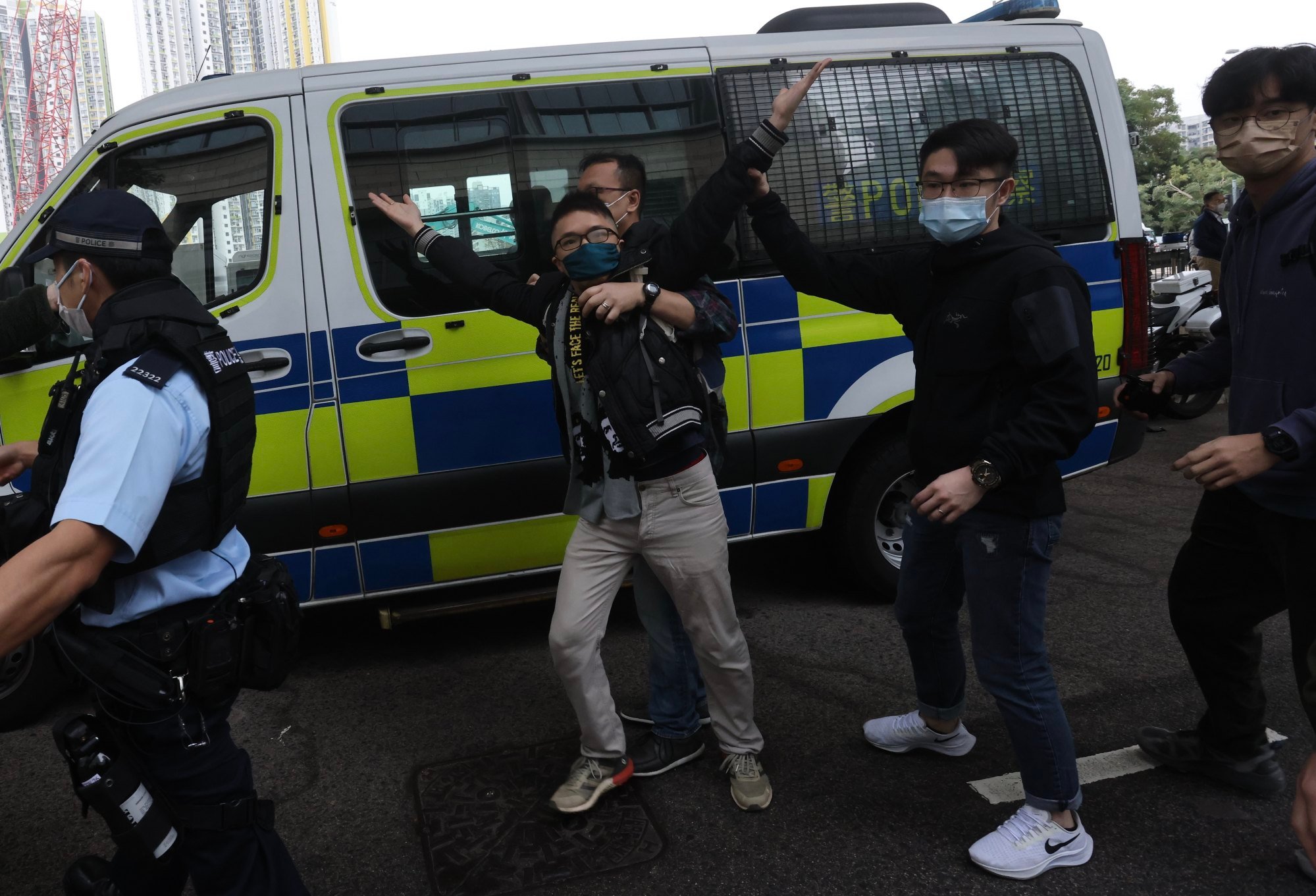
Hong Kong national security trial: prosecutors accuse 47 opposition figures of plotting to turn legislature into ‘lethal constitutional weapon’ against Beijing
- Prosecution alleges 47 defendants plotted to turn legislature into ‘lethal constitutional weapon’ against Beijing by organising and taking part in unofficial primary election
- High-profile case has garnered widespread attention both locally and overseas with police on high alert as trial opened
The prosecutors on Monday began explaining their basis for accusing the 47 of conspiracy to commit subversion, in a high-profile case which has garnered widespread attention both locally and overseas and put police on high alert as the trial opened in West Kowloon Court.

In the city’s largest national security case to date, 16 of the 47, who include activists, politicians and former lawmakers, pleaded not guilty on the first day of their estimated 90-day trial. Two others switched from previously intending to plead not guilty and admitted the charge on the same day.
“I failed to subvert the totalitarian regime and I plead guilty,” said Ng Kin-wai, one of the two.
The other was Mike Lam King-nam, boss of the Thai convenience store chain AbouThai. He and three organisers of the primary – Au Nok-hin, Andrew Chiu Ka-yin and Ben Chung Kam-lun – have agreed to testify for the prosecution.
Hong Kong opposition activists to face trial without jury in subversion case
The case centres on an unofficial primary the opposition camp held in July 2020 – in the aftermath of the 2019 anti-government unrest – to pick its best candidates for the Legislative Council elections originally set for September that year. The Legco poll was subsequently postponed because of the Covid-19 pandemic.
Prosecutor Anthony Chau Tin-hang described the primary as an unlawful scheme to seriously disrupt, undermine and interfere with the performance of duties and functions of the political power that be.
He highlighted the primary’s illegality by referring to a statement by Beijing’s liaison office in the city condemning the event as violating the newly enacted national security law.
Chau also pointed to a public statement by Erick Tsang Kwok-wai, secretary for constitutional and mainland affairs, and said the defendants had insisted on their subversive agendas despite the official’s warnings.

The prosecutor highlighted a press conference in March 2020, where primary organisers Benny Tai Yiu-ting and Au Nok-hin stated their aim was to “obtain sufficient leverage to act as a counteracting force against the Communist Party of China and the government”.
“[Tai] then further elaborated that obtaining the controlling majority in Legco could become a “lethal constitutional weapon”, as elected Legco members could veto the budget so as to compel the government to accept their political demands,” Chau told the court.
At the court building, police ramped up security measures, with dozens of officers both in uniform and plain clothes stationed on the fourth floor and a roadblock set up on Tonkin Street, a major access point near the complex.
Hong Kong justice chief vows to act on concerns over trial delay for activists
A long queue of supporters had formed outside the court since early morning, with a small protest staged by the League of Social Democrats.
To accommodate the large crowd, the judiciary turned the whole of the fourth floor into a trial venue, with the proceedings broadcast in other courtrooms as well.
Several countries sent consular representatives, including Britain, America, Australia, Canada, New Zealand, Germany, Sweden, Austria, Czech Republic, France and Italy, as did the European Union office.
The opposition-friendly league, with which some of the accused are affiliated, denounced the case as political persecution and demanded the defendants’ immediate release in a three-person demonstration outside the court building.
Midway through the protest, police took away party vice-chairman Dickson Chau Ka-fat and accused him of violating the mask mandate, after the activist pulled down his face covering while making a speech.
Party chairwoman Chan Po-ying said the police action was ridiculous. “The force has gone to all lengths to stop us,” she added.
Another Hong Kong opposition activist granted bail in national security case
At times during the trial, supporters in the public gallery cheered the defendants’ remarks from the dock, prompting one of the three judges, hand-picked by the government among a pool of jurists to hear national security cases, to intervene.
“This is a very solemn occasion. So far I paid every respect to every defendant and every member of the public. So I ask for the same respect from you,” High Court Judge Andrew Chan Hing-wai said. The other two presiding judges are Alex Lee Wan-tang and Johnny Chan Jong-herng.

The trial involves the most defendants in a case since Beijing imposed the national security law in June 2020, with many of the defendants remanded in prison since being charged in February of the following year.
Among the 18 in the dock on Monday were former opposition lawmakers Helena Wong Pik-wan, Lam Cheuk-ting, Raymond Chan Chi-chuen and “Long Hair” Leung Kwok-hung, as well as journalist turned activist Gwyneth Ho and labour rights campaigner Winnie Yu Wai-ming.
The rest were Cheng Tat-hung, Clarisse Yeung Suet-ying, Pang Cheuk-kei, Kalvin Ho Kai-ming, Lau Wai-chung, Sze Tak-loy, Ng Kin-wai, Chow Ka-shing, Mike Lam, Ricky Or Yiu-lam, Lee Yue-shun and Gordon Ng Ching-hang.
The prosecutor’s opening speech continues on Tuesday.

